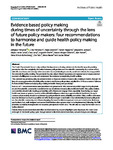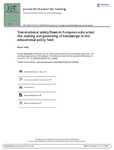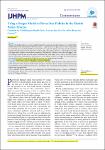Evidence based policy making during times of uncertainty through the lens of future policy makers: four recommendations to harmonise and guide health policy making in the future
| dc.contributor.author | Françoise, M | |
| dc.contributor.author | Frambourt, C | |
| dc.contributor.author | Goodwin, P | |
| dc.contributor.author | Haggerty, F | |
| dc.contributor.author | Jacques, M | |
| dc.contributor.author | Lama, M-L | |
| dc.contributor.author | Leroy, C | |
| dc.contributor.author | Martin, A | |
| dc.contributor.author | Calderon, RM | |
| dc.contributor.author | Robert, J | |
| dc.contributor.author | Schulz-Ruthenberg, E | |
| dc.contributor.author | Tafur, L | |
| dc.contributor.author | Nasser, Mona | |
| dc.contributor.author | Stüwe, L | |
| dc.date.accessioned | 2022-05-27T23:08:53Z | |
| dc.date.issued | 2022-12 | |
| dc.identifier.issn | 0778-7367 | |
| dc.identifier.issn | 2049-3258 | |
| dc.identifier.other | 140 | |
| dc.identifier.uri | http://hdl.handle.net/10026.1/19270 | |
| dc.description.abstract |
<jats:title>Abstract</jats:title><jats:p>The Covid-19 pandemic has not only outlined the importance of using evidence in the healthcare policy making process but also the complexity that exists between policymakers and the scientific community. As a matter of fact, scientific data is just one of many other concurrent factors, including economic, social and cultural, that may provide the rationale for policy making. The pandemic has also raised citizens’ awareness and represented an unprecedented moment of willingness to access and understand the evidence underpinning health policies.</jats:p><jats:p>This commentary provides policy recommendations to improve evidence-based policy making in health, through the lens of a young generation of public policy students and future policymakers, enrolled in a 24-hour course at Sciences Po Paris entitled “Evidence-based policy-making in health: theory and practice(s)”.</jats:p><jats:p>Four out of 11 recommendations were prioritised and presented in this commentary which target both policymakers and the scientific community to make better use of evidence-based policy making in health. First, policy makers and scientists should build trusting partnerships with citizens and engage them, especially those facing our target health care issues or systems. Second, while artificial intelligence raises new opportunities in healthcare, its use in contexts of uncertainty should be addressed by policymakers in terms of liability and ethics. Third, conflicts of interest must be disclosed as much as possible and effectively managed to (re) build a trust relationship between policymakers, the scientific community and citizens, implying the need for risk management tools and cross border disclosure mechanisms. Last, well-designed and secure health information systems need to be implemented, following the FAIR (findable, accessible, interoperable and reusable) principles for health data. This will take us a step further from data to ‘policy wisdom’.</jats:p><jats:p>Overall, these recommendations identified and formulated by students highlight some key issues that need to be rethought in the health policy cycle through elements like institutional incentives, cultural changes and dialogue between policy makers and the scientific community. This input from a younger generation of students highlights the importance of making the conversation on evidence-based policy making in health accessible to all generations and backgrounds.</jats:p> | |
| dc.format.extent | 140- | |
| dc.format.medium | Electronic | |
| dc.language | en | |
| dc.language.iso | eng | |
| dc.publisher | Springer Science and Business Media LLC | |
| dc.subject | Health policy | |
| dc.subject | Ethics | |
| dc.subject | Evidence based policy making | |
| dc.subject | Policy recommendations | |
| dc.title | Evidence based policy making during times of uncertainty through the lens of future policy makers: four recommendations to harmonise and guide health policy making in the future | |
| dc.type | journal-article | |
| dc.type | Letter | |
| plymouth.author-url | https://www.webofscience.com/api/gateway?GWVersion=2&SrcApp=PARTNER_APP&SrcAuth=LinksAMR&KeyUT=WOS:000797494000001&DestLinkType=FullRecord&DestApp=ALL_WOS&UsrCustomerID=11bb513d99f797142bcfeffcc58ea008 | |
| plymouth.issue | 1 | |
| plymouth.volume | 80 | |
| plymouth.publication-status | Published | |
| plymouth.journal | Archives of Public Health | |
| dc.identifier.doi | 10.1186/s13690-022-00898-z | |
| plymouth.organisational-group | /Plymouth | |
| plymouth.organisational-group | /Plymouth/Admin Group - REF | |
| plymouth.organisational-group | /Plymouth/Admin Group - REF/REF Admin Group - FoH | |
| plymouth.organisational-group | /Plymouth/Faculty of Health | |
| plymouth.organisational-group | /Plymouth/Faculty of Health/Peninsula Dental School | |
| plymouth.organisational-group | /Plymouth/REF 2021 Researchers by UoA | |
| plymouth.organisational-group | /Plymouth/REF 2021 Researchers by UoA/UoA03 Allied Health Professions, Dentistry, Nursing and Pharmacy | |
| plymouth.organisational-group | /Plymouth/Research Groups | |
| plymouth.organisational-group | /Plymouth/Research Groups/Institute of Health and Community | |
| plymouth.organisational-group | /Plymouth/Research Groups/Institute of Translational and Stratified Medicine (ITSMED) | |
| plymouth.organisational-group | /Plymouth/Research Groups/Institute of Translational and Stratified Medicine (ITSMED)/CCT&PS | |
| plymouth.organisational-group | /Plymouth/Users by role | |
| plymouth.organisational-group | /Plymouth/Users by role/Academics | |
| dc.publisher.place | England | |
| dcterms.dateAccepted | 2022-05-10 | |
| dc.rights.embargodate | 2022-5-31 | |
| dc.identifier.eissn | 2049-3258 | |
| dc.rights.embargoperiod | Not known | |
| rioxxterms.versionofrecord | 10.1186/s13690-022-00898-z | |
| rioxxterms.licenseref.uri | http://www.rioxx.net/licenses/all-rights-reserved | |
| rioxxterms.licenseref.startdate | 2022-05-18 | |
| rioxxterms.type | Journal Article/Review |




